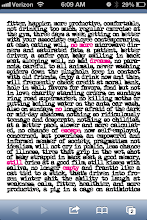In Susannah Brietz Monta's talk "Catholic Women and Pious Patronage in Reformation England," Monta mainly focuses on the life of Anne Howard, a devout Catholic woman stuck in the confines of Protestant England. She talked a lot about Howard's influence on confessional culture and works related to it. She also talked a lot about the actual printing process of these Catholic texts and how they were often hidden within other texts to disguise them during a time of great religious division.
One thing I found very interesting or compelling in Monta's talk was the "conduct manual" that was created by Southwell for Anne Howard title The Short Rule for a Good Life.
(This only gives the table of contents and the look at a few pages, but it gives you an idea of what the book was about and looked like)
This book was an attempt to reach the Catholic community during a time when it was hard to stay pious and with one's faith because people were being persecuted for their beliefs. The Short Rule linked the domestic sphere and Catholic duty, placing women in charge of the moral upbringing of the household. It was written to instill a sense of Catholic duty into women in their sphere, the home, and help establish a collective Catholic community. It was well known, even published in Protestant form where it was "masculinized," loosing its appeal to the woman in the domestic space and changing the audience the book addressed.
This was interesting to me because we saw in our readings that women were expected to uphold the morals in the household and not only teach and know them, but live by them. Many of the conduct manuals were also geared toward women and focused largely on the domestic sphere (as depicted in the conduct excerpt that is in the back of Evelina). This was the only space women had any power, and even there the power was limited. What I got out of the lecture is that Anne Howard was and strove to be a very active Catholic, yearning to change the oppressive views of England, but in a way was politely told by Southwell through the publication of The Short Rules to stay in her space where she belonged and could still be a devout Catholic. The books that were supposed to help women actually hurt them by reinforcing rules that kept women subordinate, especially when it came to writing (think back to the reception of women authors that we talked about in class in equating being to forward with their work as eqaul with a prostitute). Howard had to stay "silent, but for the word," being urged to live a dutiful Catholic life at home while Southwell and others took care of everything else. The "conduct book" seems almost like a diversion tactic to put the woman back in her place....
And here's a little glimpse into Anne Howard's writing, which Monta did not really talk about (and would have been cool if she did...but she put her email address (smonta@nd.edu) so anyone can contact her with questions and the like):
"In sad and ashy weeds"
Anne Dacres Howard, Countess of Arundel (1557-1630)
In sad and ashy weeds
I sigh, I groan, I pine, I mourn;
My oaten yellow reed
I all to jet and ebon turn.
My wat'ry eyes
Like winter's skies,
My furrowed cheeks o'erflow.
All heav'ns know why
Men mourn as I,
And who can blame my woe?
In sable robes of night
My days of joy consumed be;
My sorrow sees no light;
My lights through sorrow nothing see:
For now my sun
His course hath run,
And from his sphere doth go,
To endless bed
Of souldered lead,
And who can blame my woe?
My flocks I now forsake,
That so my sheep my grief may know;
The lilies loath to take
That since his death presumed to grow.
I envy air
Becuase it dare
Still breathe, and he not so;
Hate earth, that doth
Entomb his youth,
And who can blame my woe?
Saturday, April 25, 2009
Subscribe to:
Post Comments (Atom)




No comments:
Post a Comment